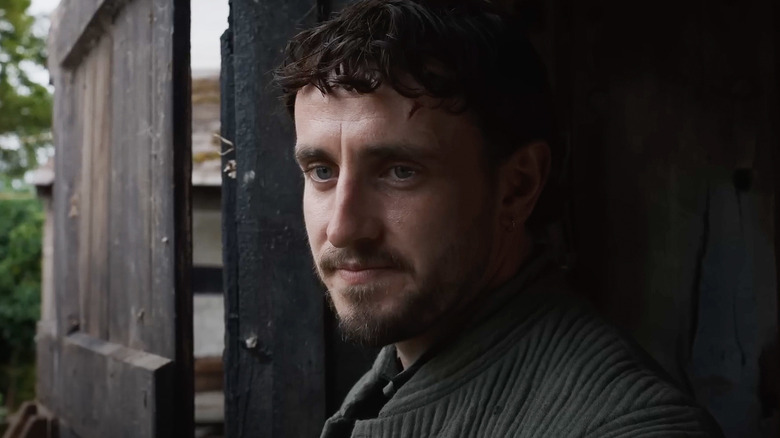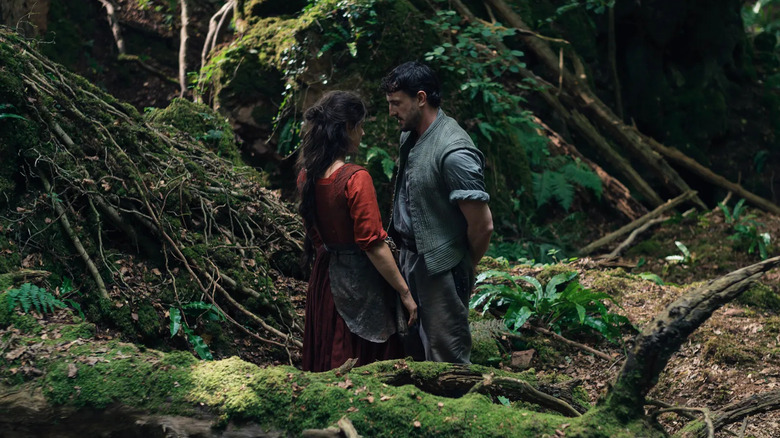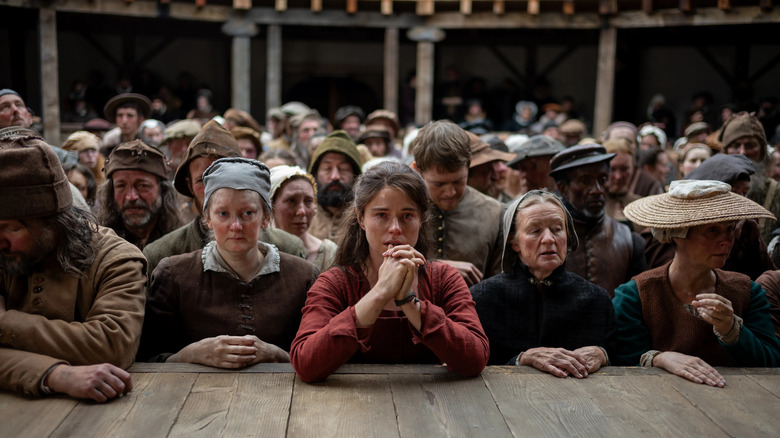Is Chloé Zhao's Hamnet Based On A True Story?
Don't set off into the woods or head to the city for work if you haven't read or watched "Hamnet." Spoilers ahead!
Is "Hamnet" based on a true story? Truthfully, it's complicated, and the answer is "sort of, maybe!" Allow me to explain. Helmed by Oscar-winning director Chloé Zhao and based on an acclaimed, best-selling novel by Maggie O'Farrell (who co-wrote the script with Zhao) — "Hamnet" tells us that the names Hamnet and Hamlet are interchangeable ... so that should give you a pretty big clue right off the bat. Though we don't learn the name of Paul Mescal's tutor and aspiring writer right away as he romances a wild young woman named Agnes (the incomparable Jessie Buckley), we ultimately discover that he's none other than William Shakespeare.
So why is this so complicated? Obviously, academics disagree on almost everything having to do with Shakespeare — I'm sure you, like me, have heard the suppositions that Shakespeare wasn't a "real" writer but a collective of people, and that's just one instance of a disagreement — but we do know that the real Shakespeare had a son named Hamnet who died when he was young in Shakespeare's country home base in Stratford-upon-Avon. Hamnet also likely had a twin sister named Judith, who appears in the film (Hamnet is played by Jacobi Jupe, while Judith is portrayed by Olivia Lynes). There are some contested details here, between the fact that Shakespeare's wife was either named Agnes or Anne Hathaway — but I have a sneaking suspicion that, when O'Farrell wrote "Hamnet," she perhaps wanted to avoid the latter due to the very real and alive actress named Anne Hathaway — and the impact that Hamnet's death had on his father's writing. Ultimately, the deal is that "Hamnet" is based on history, but takes some liberties.
The narrative of Hamnet concerns William Shakespeare's early life and his family
Jessie Buckley's Agnes is the first person we see on screen in "Hamnet" as she spends time in the woods, where she's seemingly most comfortable. Agnes notably has a pet kestrel (a type of falcon that hunts) that is closely loyal to her and very well-trained, and it's clear that she treasures her moments with the unnamed kestrel. After seeing a young Will tutor her siblings, she takes notice of the man and ultimately allows herself to be seduced by him; when Agnes realizes she's pregnant, the Hathaway and Shakespeare families panic a bit but ensure that the two are married quickly and efficiently.
Agnes ends up wandering off into the woods to give birth to the couple's eldest child, a daughter they name Susanna (Bodhi Rae Breathnach), and her brother Bartholomew (Joe Alwyn) and Will ultimately find her laying against a mossy tree holding her newborn — but as Agnes adapts to motherhood, Will's career grows more and more successful, leaving her alone in the country to care for a young and fussy Susanna. Still, when she finds herself pregnant again, the couple is happy to welcome more children, but Agnes' childbirth is genuinely terrifying when it's revealed that she's carrying twins, and the second child delivered, Judith, doesn't initially cry and barely survives (in contrast to Hamnet, who thrives immediately). Judith survives, and it's obvious that, when Will is home, the family has a loving and beautiful home life, with the children "performing" little plays to please their parents. That's when tragedy strikes.
Hamnet builds will leave you stunned, devastated, and strangely elated
As a deadly sickness sweeps England — based on the timeline and my obsession with the absolute mess that was Henry VIII's reign during the Tudor era, I would guess that it's one known as the "sweating sickness," but the movie doesn't name it and we don't know precisely how the real Hamnet Shakespeare died — Judith falls ill, sending Agnes into an understandable panic. Hamnet, afraid that his sister (who's had a weaker immune system, apparently, since birth) might die, gets into her sickbed after Agnes tries to heal her daughter through traditional herbal remedies she learned from her own mother. As he tries to "take her place," Hamnet contracts the sickness instead, and although Judith recovers, Hamnet dies at just 11 years old.
The worst part of Hamnet's death, as far as Agnes is concerned, is her husband's conspicuous absence; he's working on plays with his company in London at the time and though he receives word that Judith is ill and rushes back to Stratford-upon-Avon, Will arrives too late to say goodbye to his son (and didn't even get any updates that Hamnet fell ill in the first place). A divide opens between Will and Agnes that may or may not be mendable, but when Bartholomew and Agnes learn that Will's upcoming play in the city is called "Hamlet," they rush to the Globe and join the groundlings for the performance.
Between Will himself playing the ghost of Hamlet's royal father to the moment that Hamlet "dies" on stage, Agnes is rapt, realizing that Will immortalized their son in the play. It's a stunning and deeply satisfying conclusion to a devastating story of grief, and potentially gives us a glimpse into what went into Shakespeare's play "Hamlet."
"Hamnet" is now playing in theaters everywhere.


